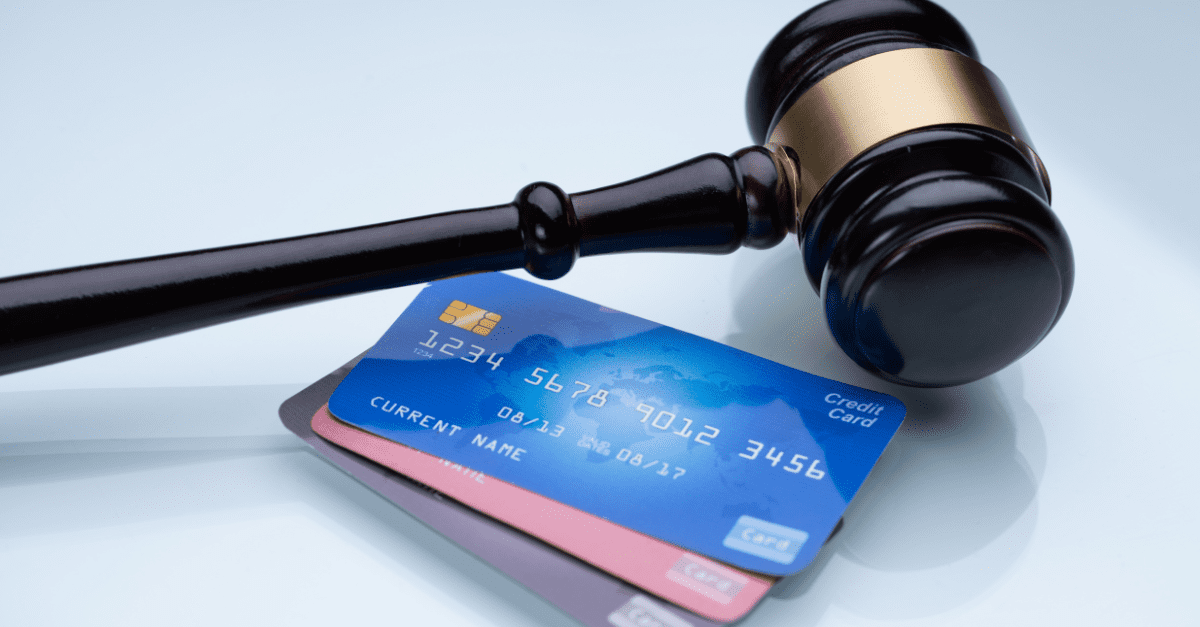
When you owe money on your credit card, your credit card company can send your account to a collection agency or pursue legal action through the court.
If you are behind on credit card payments and facing the possibility of being sued for credit card debt, the most important thing is not to panic. In this post, we explain how to stop court proceedings, potentially negotiate with debt collectors and seek help with unpaid credit card debt.
Table of Contents
What happens when you are sued for credit card debt?
Credit card companies are unsecured creditors. Their rights to collect do not include automatically seizing your assets. They must apply to the court to garnish your wages or seize money from your bank account.
In Ontario you can be sued in Small Claims Court for a value of up to $35,000 or less. If you’re being sued for more than $35,000 your case would go to the Superior Court of Justice.
Let’s look at the steps in the court process to consider when being sued for credit card debt:
1. Validate the debt
Before a debt collector contacts you, they must first send evidence that you owe the debt. This is known as a validation letter.
In Ontario and many provinces in Canada, debt collection laws mandate that debt collectors send a validation letter at least six days before contacting you. This letter must include information such as the amount of money you owe, the type of debt, who you owe (the original creditor) and the name and contact information of the collection agency demanding payment.
2. Collection calls
After six days, a debt collector can contact you to attempt to collect payment. This may involve receiving phone calls, emails, or text messages. The contact can come from the original creditor or a third-party debt collector.
Additionally, creditors may send demand letters by mail to formally request payment for the unpaid debt.
3. Statement of claim
If attempts to recover the debt through communication and reminders are unsuccessful, your creditor may escalate the matter by filing a statement of claim in court. The document tells the court that the plaintiff (your creditor) is initiating a legal proceeding against you (the defendant) to collect a debt.
4. Statement of defence – don’t ignore the summons
Upon receiving a statement of claim, you must respond in a specified timeframe. In Ontario, for example, you must file either a statement of defence or notice of intention to defend within 20 days. The statement of defence allows you, as the debtor, to present your side of the case or contest the debt.
It’s important not to ignore legal action taken by a debt collector. Failing to respond could result in a default judgment being issued without further notice.
5. Court order or judgment order
If the court rules in favour of the creditor after reviewing both parties’ arguments, a court order or judgment order is issued. This formal document acknowledges that the debt is owed and grants the creditor the legal right to pursue further collection actions to recover the unpaid debt.
6. Legal recovery options
Once a court order or judgment order is obtained, your creditor can pursue legal recovery actions to collect on an unpaid debt. These commonly include:
-
Seizing other assets such as vehicles or real estate.
-
Placing a lien on your property prohibiting you from selling before the debt is paid off.
Worried about credit card debt?
How do I defend myself against a credit card debt lawsuit?
If you’re facing a lawsuit for credit card debt, here are some common defences you can consider:
You don’t owe the debt: If you believe the debt does not belong to you due to mistaken identity, identity theft, or fraudulent credit card charges, advise the court. Provide any evidence you may have to support your defence.
Statute of Limitations: This defence applies if the debt is too old to be enforced through the courts. Also known as a time-barred debt, you tell the court your creditor can’t pursue legal action because the statute of limitation period has expired. In Ontario, that limitation period is two years. The clock usually starts from the date of your last payment. You still owe the debt, but your credit card company can’t pursue you through the courts to collect.
Payment of the credit card debt, in full or part: If you have already paid the account or reached a settlement agreement with the creditor, provide evidence to the court that proves you no longer owe the debt.
Discharge in a bankruptcy or consumer proposal: Certain debts may have been discharged if you previously filed a bankruptcy or proposal. Contact your licensed insolvency trustee to confirm the debt in question was discharged. Provide a copy of your discharge or certificate of completion if needed.
You reside outside of Canada: If you don’t reside in Canada and have no assets within the country, creditors may face challenges in enforcing judgments against you. It is not a legal defence but something worth considering when deciding how to proceed.
Are you creditor-proof? If you lack income or assets that can be garnished, you may be considered “creditor-proof,” further limiting the creditor’s ability to collect on the debt. Understanding what types of income can be garnished is important so you know what options you should consider to deal with collection actions.
Impact of a lawsuit on your credit report
The impact of a lawsuit on your credit report can be profound. It will negatively impact your credit score and how lenders view your creditworthiness. A low credit score can make qualifying for better loan terms, or other credit card offers more challenging.
Late payments leading up to a lawsuit remain on your credit report for up to six years.
When an account is sent to a collection agency, this status will also remain on your credit report for six years.
The most severe consequence of a lawsuit is the judgment that may be issued against you. The duration a judgment remains on your credit report varies by province, typically ranging from six to ten years.
Credit card companies and other lenders regularly review credit reports to assess the risk of extending more credit. A tarnished credit report resulting from late payments, accounts in collections, or judgments can lead to higher interest rates, lower credit limits, or even denials of credit applications. It’s essential to address debts promptly and responsibly to minimize the long-term impact on your credit report and overall financial health.
Making a settlement offer out of court
If your credit card company threatens to sue or has issued a statement of claim, you can still negotiate a settlement offer.
Many credit card companies hesitate to incur legal fees and court costs to pursue legal action, particularly for small balances or old debts.
You can negotiate a debt settlement on your own, either with the original creditor or a debt collection agency. Here are some tips:
-
You may be able to settle an outstanding credit card debt for less than the full amount owed. The older the debt the more of a discount you can ask for. Start with 30%.
-
You will get a better settlement if you can make a lump sum payment.
-
If the debt is large, you can suggest a payment plan and ask for a reduced interest rate.
-
Be sure you can afford the monthly payments you offer. A failed settlement program will mean a return to collection calls and possible court action.
-
Document any offer in writing to ensure all parties adhere to the terms.
If you don’t want to deal with the collection agency alone, a credit counselling agency may be able to help. A credit counsellor can set up a debt management plan so you can avoid a court proceeding. However, if you repay your debts through a credit counselling program, you must repay the full amount of what you owe.
Also, it’s important to note that informal settlement offers are not legally binding on more than one creditor, and acceptance is not guaranteed.
Creditor protection with a consumer proposal or bankruptcy
For those facing overwhelming debt, options such as bankruptcy or a consumer proposal provide creditor protection and may be a better path toward financial recovery.
Both a bankruptcy and consumer proposal provide a legal stay of proceedings, which stops any collection actions against you, including a debt collection lawsuit and garnishments.
A consumer proposal is a legally binding debt settlement agreement negotiated with your creditors through a Licensed Insolvency Trustee. It involves an offer to pay creditors a percentage of what you owe.
A consumer proposal deals with unsecured debt and can include other types of debt, including student loans, lines of credit, and tax debts. Once accepted, it is binding on all unsecured creditors.
If a consumer proposal does not suit your situation, your trustee may suggest bankruptcy as a last resort.
Speak with a Licensed Insolvency Trustee
If you’re facing the prospect of being sued for outstanding credit card debt, consider talking with a Licensed Insolvency Trustee.
A Licensed Insolvency Trustee can offer personalized solutions to suit your financial situation and help you compare debt relief options like a consumer proposal or credit counselling.
Contact us today for a free consultation.





